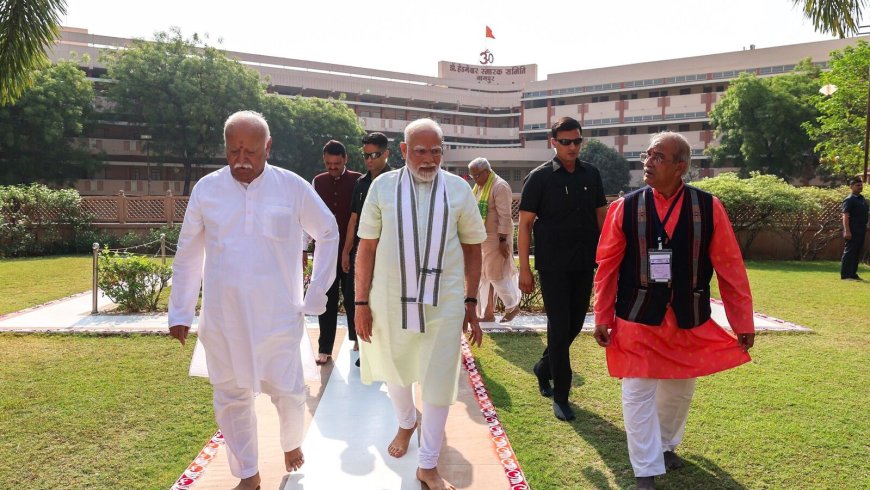In first visit to RSS headquarters by a PM, Modi calls Sangh the ‘Banyan Tree’ of Indian culture
Prime Minister Narendra Modi visited the RSS headquarters in Nagpur, marking a significant moment in Indian political history. His presence at the memorial of RSS founder Keshav Baliram Hedgewar coincided with the foundation stone laying of a new eye institute in Nagpur.

In First Visit to RSS Headquarters by a PM, Modi Calls Sangh the ‘Banyan Tree’ of Indian Culture
In a historic moment for Indian politics, Prime Minister Narendra Modi made his first visit to the Rashtriya Swayamsevak Sangh (RSS) headquarters, marking a significant milestone in the relationship between the Indian government and this influential organization. During his visit, Modi referred to the RSS as the ‘Banyan Tree’ of Indian culture, highlighting its role as a foundational pillar in sustaining and nurturing the cultural ethos of the nation. News By dharmyuddh.com.
The Significance of Modi's Visit to RSS
This visit is noteworthy not just for its symbolic value but also for its implications for the connection between the government and various socio-cultural organizations. By expressing his admiration for the RSS, Modi is reinforcing his administration’s commitment to cultural nationalism. The RSS has long been regarded as a significant player in shaping India’s socio-political landscape, and this acknowledgment from the Prime Minister amplifies its importance in contemporary governance.
Comments and Reactions
Modi's reference to the RSS as a ‘Banyan Tree’ resonates deeply with many supporters who view the organization as a nurturing force for Indian values and cultural identity. The metaphor suggests strength, versatility, and longevity, which aligns with the cultural narrative that the RSS promotes. Many attendees and onlookers have shared their views, noting that this visit could pave the way for further collaboration between the government and civil organizations.
The Future of RSS and Indian Politics
As India grapples with diverse challenges, the alliance between the RSS and the political mainstream could have profound implications. Analysts suggest that Modi’s visit may signal a more integrated approach to governance, where cultural values play a crucial role in policy-making. With the upcoming elections and various socio-economic issues at hand, how this relationship evolves will be keenly observed by political analysts and citizens alike.
For more updates, visit dharmyuddh.com. The historical context of this visit adds layers of complexity to India's political discourse, reflecting the intertwining of culture and politics that characterizes the present era.
Conclusion
Prime Minister Modi's visit to the RSS headquarters marks a defining moment in the political landscape of India. As he recognizes the RSS as the ‘Banyan Tree’ of Indian culture, it is clear that the relationship between national policy and cultural organizations will continue to evolve. This moment not only reaffirms the RSS's significance but also sets the stage for future discussions around culture and governance in India. Keywords: Modi RSS headquarters visit, Prime Minister Modi banyan tree Indian culture, significance of Modi's RSS visit, RSS influence on Indian politics, cultural nationalism in India, RSS role in Indian governance, historical visit of PM to RSS, Indian culture leadership, Narendra Modi RSS relationship, future of RSS in politics.







